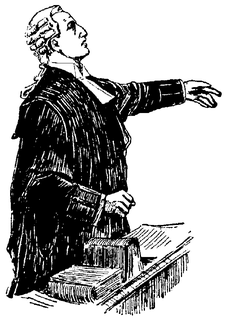
A barrister is a type of lawyer in common law jurisdictions. Barristers mostly specialise in courtroom advocacy and litigation. Their tasks include taking cases in superior courts and tribunals, drafting legal pleadings, researching the philosophy, hypothesis and history of law, and giving expert legal opinions.

A lawyer or attorney is a person who practices law, as an advocate, attorney at law, barrister, barrister-at-law, bar-at-law, canonist, canon lawyer, civil law notary, counsel, counselor, solicitor, legal executive, or public servant preparing, interpreting and applying the law, but not as a paralegal or charter executive secretary. Working as a lawyer involves the practical application of abstract legal theories and knowledge to solve specific individualized problems, or to advance the interests of those who hire lawyers to perform legal services. The role of the lawyer varies greatly across different legal jurisdictions.
In its most general sense, the practice of law involves giving legal advice to clients, drafting legal documents for clients, and representing clients in legal negotiations and court proceedings such as lawsuits, and is applied to the professional services of a lawyer or attorney at law, barrister, solicitor, or civil law notary. However, there is a substantial amount of overlap between the practice of law and various other professions where clients are represented by agents. These professions include real estate, banking, accounting, and insurance. Moreover, a growing number of legal document assistants (LDAs) are offering services which have traditionally been offered only by lawyers and their employee paralegals. Many documents may now be created by computer-assisted drafting libraries, where the clients are asked a series of questions that are posed by the software in order to construct the legal documents. In addition, regulatory consulting firms also provide advisory services on regulatory compliance that were traditionally provided exclusively by law firms.
An attorney at law in the United States is a practitioner in a court of law who is legally qualified to prosecute and defend actions in court on the retainer of clients. Alternative terms include counselor and lawyer. As of April 2011, there were 1,225,452 licensed attorneys in the United States. A 2012 survey conducted by LexisNexis Martindale-Hubbell determined 58 million consumers in the U.S. sought an attorney in the last year and that 76 percent of consumers used the Internet to search for an attorney.
A paralegal is a professional who performs tasks that require knowledge of legal concepts but not the full expertise of a lawyer. The market for paralegals is broad, including consultancies, companies that have legal departments or that perform legislation compliance activities in areas such as environment, labor, intellectual property and tax. Legal offices and public bodies also have many paralegals in support activities although they do not yet use the correct name of the profession.

Temporary work or temporary employment refers to an employment situation where the working arrangement is limited to a certain period of time based on the needs of the employing organization. Temporary employees are sometimes called "contractual", "seasonal", "interim", "casual staff", "outsourcing", "freelance"; or the words may be shortened to "temps". In some instances, temporary, highly skilled professionals refer to themselves as consultants. Increasingly, executive-level positions are also filled with Interim Executives or Fractional Executives.
Freelance, freelancer, or freelance worker, are terms commonly used for a person who is self-employed and not necessarily committed to a particular employer long-term. Freelance workers are sometimes represented by a company or a temporary agency that resells freelance labor to clients; others work independently or use professional associations or websites to get work.
A bar examination is an examination administered by the bar association of a jurisdiction that a lawyer must pass in order to be admitted to the bar of that jurisdiction.
A public defender is a lawyer appointed to represent people who otherwise cannot reasonably afford to hire a lawyer to defend themselves in a trial. Several countries provide people with public defenders, including the UK, Hungary and Singapore, and some states of Australia. Brazil is the only country in which an office of government-paid lawyers with the specific purpose of providing full legal assistance and representation to the needy free of charge is established in the constitution. The Sixth Amendment of the US Constitution has been interpreted to require the US government to provide free legal counsel to indigent defendants in criminal cases, and public defenders in the United States are full-time lawyers employed by or under contract with the state or federal governments.

A law firm is a business entity formed by one or more lawyers to engage in the practice of law. The primary service rendered by a law firm is to advise clients about their legal rights and responsibilities, and to represent clients in civil or criminal cases, business transactions, and other matters in which legal advice and other assistance are sought.
Legal profession is a profession in which legal professionals study, develop and apply law. Usually, there is a requirement for someone choosing a career in law to first obtain a law degree or some other form of legal education.
Attorney's fee is a chiefly United States term for compensation for legal services performed by an attorney for a client, in or out of court. It may be an hourly, flat-rate or contingent fee. Recent studies suggest that when lawyers charge a flat-fee rather than billing by the hour, they work less hard on behalf of clients and clients get worse outcomes. Attorney fees are separate from fines, compensatory and punitive damages, and from court costs in a legal case. Under the "American rule", attorney fees are usually not paid by the losing party to the winning party in a case, except pursuant to specific statutory or contractual rights.

In Poland, any person holding a Magister's degree in law is called a "jurist" or "lawyer". According to Polish legal doctrine, a lawyer should be understood as a person who graduated from law school with the aforementioned degree, even if such a person does not practice law after graduation.
Of counsel is the title of an attorney in the legal profession of the United States who often has a relationship with a law firm or an organization but is neither an associate nor partner. Some firms use titles such as "counsel", "special counsel", and "senior counsel" for the same concept. According to American Bar Association Formal Opinion 90-357, the term "of counsel" is used to describe a "close, personal, continuous, and regular relationship" between the firm and counsel lawyer. In large law firms, the title generally denotes a lawyer with the experience of a partner, but who does not carry the same workload or business development responsibility.
Legal outsourcing, also known as legal process outsourcing (LPO), refers to the practice of a law firm or corporation obtaining legal support services from an outside law firm or legal support services company. When the LPO provider is based in another country, the practice is called offshoring and involves the practice of outsourcing any activity except those where personal presence or contact is required, e.g. appearances in court and face-to-face negotiations. When the LPO provider is based in the same country, the practice of outsourcing includes agency work and other services requiring a physical presence, such as court appearances. This process is one of the incidents of the larger movement towards outsourcing. The most commonly offered services have been agency work, document review, legal research and writing, drafting of pleadings and briefs, and patent services.
A duty solicitor, duty counsel, or duty lawyer, is a solicitor whose services are available to a person either suspected of, or charged with, a criminal offence free of charge, if that person does not have access to a solicitor of their own and usually if it is judged by a means test that they cannot afford one. The system is operative in several Commonwealth countries, including the United Kingdom, Australia, New Zealand and Canada.
Law practice management (LPM) is the management of a law practice. In the United States, law firms may be composed of a single attorney, of several attorneys, or of many attorneys, plus support staff such as paralegals/legal assistants, secretaries, and other personnel.

A retainer agreement is a work-for-hire contract. It falls between a one-off contract and permanent employment, which may be full-time or part-time. Its distinguishing feature is that the client or customer pays in advance for professional work to be specified later. The purpose of a retainer fee is to ensure that the employed reserves time for the client in the future when their services are needed.

Legal technology, also known as Legal Tech, refers to the use of technology and software to provide legal services and support the legal industry. Legal Tech companies are often startups founded with the purpose of disrupting the traditionally conservative legal market.
UpCounsel is an online marketplace for legal services created to enable users, primarily entrepreneurs and businesses, to find and hire attorneys. The company is based in San Francisco, California. Initially, UpCounsel provided service to users in California and New York.






